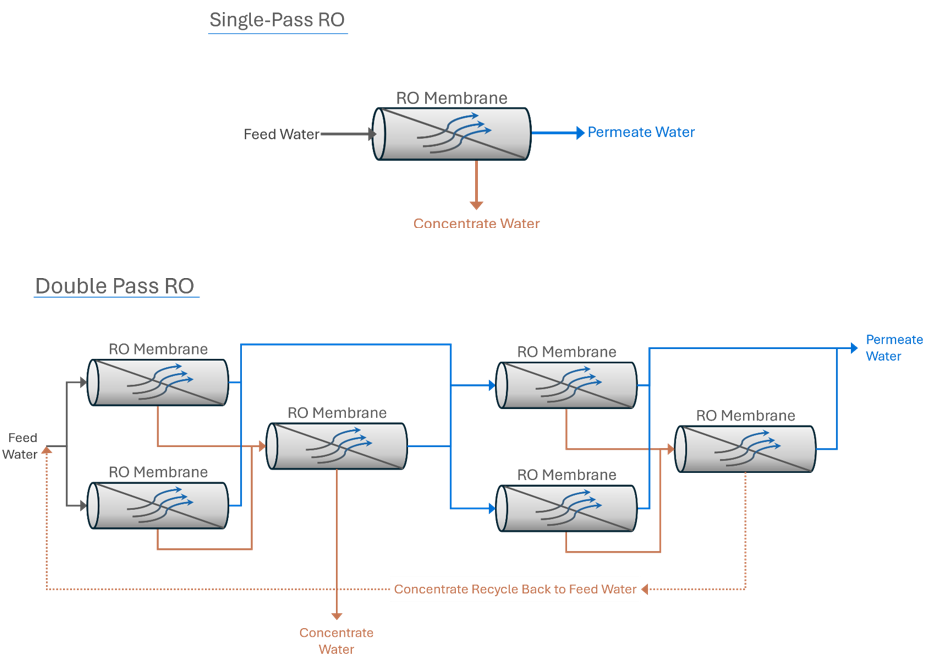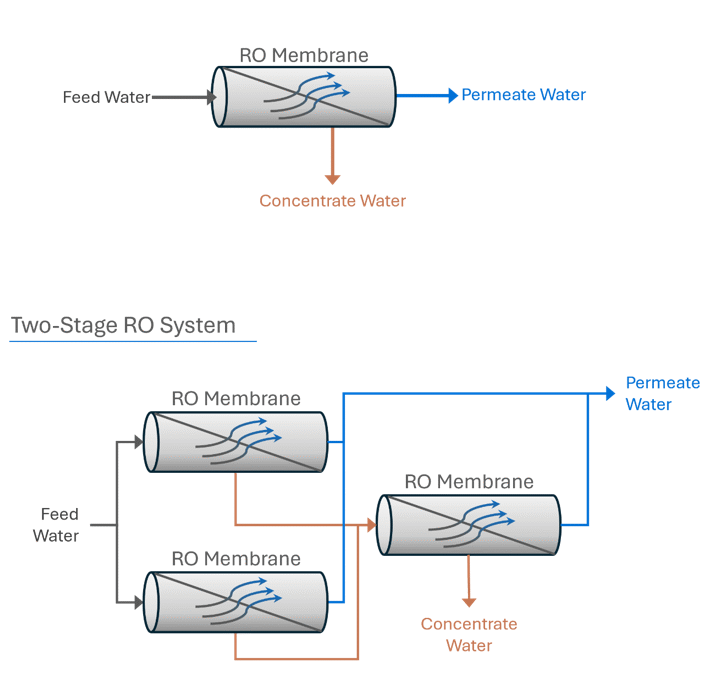Have you ever felt a bit bloated or gassy after drinking a glass of RO water? You might find it surprising that something as pure and clean as reverse osmosis water could be linked to digestive discomfort.
RO water is known for its ability to remove impurities and contaminants, but can it also be the culprit behind your gassy moments? We’ll dive into the science behind RO water and its impact on your gut. We’ll explore whether this purified water is causing more harm than good and what you can do to ensure your hydration doesn’t come with an unwanted side of gas.
Stick around as we unravel the truth and help you make the best choice for your digestive health!
What Is Ro Water?
Have you ever wondered what “RO water” means and why it’s gaining so much attention? RO water, or Reverse Osmosis water, is purified water that has gone through a filtration process to remove impurities. This type of water is often discussed in health and environmental circles. Is it just another health fad, or is there more to it?
Process Of Reverse Osmosis
The process of reverse osmosis is fascinating yet straightforward. It involves pushing water through a semi-permeable membrane to filter out unwanted substances. These substances can include anything from salt and chlorine to dirt and bacteria.
Think about how a sieve works in your kitchen, separating solids from liquids. Reverse osmosis does something similar but at a microscopic level. The result is water that’s cleaner and often tastes better.
This process is particularly popular in areas where tap water is heavily chlorinated or contains high levels of minerals. Reverse osmosis offers a practical solution for those wanting to improve their water quality at home.
Common Uses Of Ro Water
RO water isn’t just for drinking. It’s used in a variety of settings, from homes to industrial applications. In households, it’s often used for cooking, brewing coffee, and even watering sensitive plants.
In industrial settings, RO water is crucial for processes that require high-purity water, such as in pharmaceuticals or electronics manufacturing. It’s also popular in aquariums, where stable water conditions are vital for fish health.
But have you ever considered if RO water could be causing you discomfort, like gas? It’s a question worth pondering, especially if you’ve recently switched to RO water and noticed changes. Understanding the uses and effects of RO water can help you decide if it’s the right choice for you.
Have you tried RO water? What differences did you notice in your daily activities? Your experience could help others make informed decisions about their water sources.

Credit: puretecwater.com
Myths About Ro Water
Reverse Osmosis (RO) water often faces scrutiny and myths. Some individuals express concerns about its safety and health benefits. Let’s clear up some common misconceptions surrounding RO water.
Health Concerns And Misconceptions
Many people believe RO water causes gas and bloating. This is not supported by scientific evidence. The process of reverse osmosis removes impurities but doesn’t add gas-producing substances. Myths about health risks often stem from misunderstandings about the filtration process. RO water is safe and clean for consumption. It removes contaminants without altering the water’s basic composition.
Claims Of Nutrient Loss
A frequent claim is that RO water lacks essential minerals. It’s true, reverse osmosis removes some minerals. But the minerals in water contribute minimally to daily intake. Most nutrients come from food, not water. So, drinking RO water won’t cause nutrient deficiency. It’s a myth that RO water negatively impacts health. It’s important to focus on a balanced diet for essential nutrients.
Scientific Perspective On Gas
RO water, known for its purity, often raises concerns about causing gas. The process removes essential minerals, possibly affecting digestion. Sensitive individuals might experience gas due to this mineral imbalance.
Understanding the science of gas formation can clarify many doubts. Gas, often called bloating, occurs when the digestive system reacts. The reaction involves bacteria breaking down undigested food. This process can release gases like hydrogen, methane, and carbon dioxide. The human body may not absorb these gases, leading to discomfort. This can cause sensations of fullness or pressure in the abdomen.
Understanding Gas Formation
Gas forms in the digestive tract naturally. It results from swallowing air and food digestion. Certain foods are more likely to cause gas. Beans, broccoli, and carbonated drinks often lead to increased gas. The body may struggle to digest some carbohydrates. These undigested particles then ferment in the colon. Bacteria in the colon produce gases during this fermentation.
Factors Contributing To Gas
Several factors can influence gas production. Diet plays a significant role. Foods high in fiber can increase gas in the digestive system. Some people are sensitive to specific sugars. Lactose or fructose intolerance can lead to gas. The rate of digestion also affects gas levels. Faster digestion might not fully break down certain foods. Stress or anxiety can speed up digestion processes. This can result in more gas being produced. `

Credit: www.simpurelife.com
Ro Water And Digestive Health
Have you ever wondered if the water you drink can affect your digestive health? Reverse Osmosis (RO) water is often praised for its purity, but does it come with hidden effects? Let’s dive into the relationship between RO water and your digestive system.
Impact On Stomach Acidity
Stomach acidity plays a crucial role in digestion. It helps break down food and kill harmful bacteria. Some believe that RO water, being devoid of minerals, might dilute stomach acid. But is this true?
Drinking RO water won’t drastically alter your stomach’s acidity. Your body adjusts to maintain necessary acidity levels. So, you can enjoy your glass of RO water without worry.
Still, it’s essential to ensure a balanced diet. A varied intake of foods can support your stomach’s natural functions effectively.
Hydration And Metabolism
Proper hydration is key to a healthy metabolism. RO water provides clean hydration, free from contaminants. But how does this impact your metabolism?
Well-hydrated cells function optimally. This supports energy production and waste removal. Drinking enough RO water can help your metabolism run smoothly.
Think about your daily water intake. Are you drinking enough? Adjusting your habits could be a simple way to improve your metabolic health.
Have you noticed any changes in your digestion after switching to RO water? Share your thoughts or experiences, and let’s continue the conversation!
Expert Opinions
Many wonder if RO water can cause gas. Experts provide insights. They explore the science behind these claims. Understanding their viewpoints can guide our choices.
Research Findings
Studies examine RO water’s impact on digestion. Research shows it removes impurities. This process ensures cleaner water. Yet, some claim it affects gut health. The removal of minerals might play a role. Minerals support digestion. Their absence could lead to gas.
Nutritionists’ Insights
Nutritionists discuss RO water’s effects on the body. They highlight its purity. Clean water supports overall health. But, missing minerals are a concern. Essential minerals aid digestion. Without them, some people might experience gas. A balanced diet helps counter this.

Credit: www.simpurelife.com
Comparing Ro Water With Other Types
Exploring the effects of RO water on digestion raises questions about its impact on gas. RO water undergoes filtration, removing minerals that might affect stomach acidity. This absence of minerals can sometimes lead to digestive discomfort, including gas, in sensitive individuals.
When it comes to choosing the right type of water for your daily consumption, understanding the differences can be crucial. RO (Reverse Osmosis) water has gained popularity for its purification process, but how does it stack up against other water types in terms of causing gas? Let’s delve into a comparison with mineral water and tap water to uncover the nuances that could affect your digestive comfort.
Mineral Water
Mineral water is celebrated for its natural composition of essential minerals like calcium and magnesium. These minerals can aid digestion and might even reduce gas formation. Imagine sipping mineral water on a hot day, feeling refreshed without the worry of bloating. Unlike RO water, which removes minerals, mineral water retains these naturally occurring elements that can be beneficial for your gut health. But here’s the catch: some mineral waters are carbonated, and carbonation can lead to gas. So while the minerals are helpful, the bubbles might not be.
Tap Water
Tap water is often the most accessible choice, but its composition varies greatly depending on your location. It’s treated to remove contaminants, but it retains minerals similar to those found in mineral water. Ever noticed how tap water can taste different in various cities? This is due to the mineral content, which can also affect digestion and gas production. However, tap water can sometimes contain chemicals like chlorine, which might contribute to gas issues for sensitive individuals. So, while tap water can be convenient, it might not always be the best choice for those worried about digestive discomfort. — Comparing these water types brings up an interesting question: What matters more to you, mineral content or purity? Each water type offers unique benefits, and understanding these can help you make an informed choice that aligns with your health goals. Would you sacrifice minerals for purity, or find a balance that suits your digestive well-being?
Addressing Common Concerns
Many people worry about whether RO (Reverse Osmosis) water can cause gas. It’s a valid concern, especially if you’ve experienced discomfort after drinking it. But before jumping to conclusions, it’s important to delve into the facts and science behind it. Are there safety measures in place to ensure RO water doesn’t upset your stomach? Does it meet quality standards? Let’s break it down.
Safety Measures
RO systems are designed to remove contaminants, including bacteria and viruses. They use a semi-permeable membrane that filters out impurities. This process ensures that the water is clean and safe for consumption. However, if you’re sensitive to mineral changes, this might affect your digestion.
Have you ever considered how your body reacts to different water types? Sometimes, it’s not the filtration but how your stomach adjusts to mineral content. Ensure your RO system is maintained regularly. Clean filters and membranes will keep your water safe.
Regular maintenance can prevent any potential issues. Are you checking your system’s service schedule? Keeping up with it can ensure your water remains safe and doesn’t cause discomfort.
Quality Standards
RO water should meet specific quality standards. These standards ensure that the water is free from harmful substances. Look for certifications like NSF or WQA when selecting your RO system. These labels guarantee the water has been tested and meets safety guidelines.
Are you confident your RO water meets these standards? Checking for certifications can offer peace of mind. You want to ensure you’re drinking water that is not only clean but also safe for your digestive system.
RO water often lacks minerals found in tap water. Do you notice any difference in taste? Some people add mineral drops to RO water to enhance flavor and balance. Could this simple addition help if you’re experiencing gas?
If you have concerns about your water quality, take action. Test your water regularly to ensure it’s up to standard. This proactive step can prevent any unwanted surprises in your health.
Have you ever thought about how your diet interacts with RO water? It’s worth considering if certain foods paired with RO water might be causing gas. Adjusting your food choices can be an easy fix to a potentially uncomfortable problem.
Ultimately, understanding the safety measures and quality standards of RO water can help address common concerns. By staying informed and proactive, you can enjoy clean, safe water without the worry of discomfort. Have you taken steps to ensure your RO system is running optimally? Now might be the perfect time to do so.
Final Thoughts On Ro Water And Gas
Final thoughts on RO water and gas bring clarity to a common concern. Many people wonder if RO water can cause gas. Understanding the process and effects of RO water can help. It’s important to know the facts to make informed choices.
Can Ro Water Cause Digestive Issues?
RO water is purified through a reverse osmosis system. This removes impurities and minerals, resulting in clean water. Some believe it lacks essential minerals, which may impact digestion. Studies show RO water is safe for consumption. People with sensitive stomachs might experience mild discomfort.
The Role Of Minerals In Water
Minerals play a crucial role in maintaining health. They support digestion and overall well-being. RO water removes most minerals, which can be a concern for some. Drinking mineral-rich water or supplements can balance mineral intake. This helps avoid any potential digestive issues.
Individual Sensitivities To Ro Water
Everyone’s digestive system reacts differently. Some might find RO water causes mild gas. Others may not notice any change. Paying attention to your body’s response is key. If gas occurs, consider adding minerals to your diet.
Balancing Ro Water In Your Diet
Combining RO water with a mineral-rich diet is beneficial. This ensures your body gets the necessary nutrients. Eating fruits, vegetables, and nuts can provide essential minerals. This approach helps maintain digestive health and prevent discomfort.
Expert Opinions On Ro Water
Health experts agree RO water is safe. It provides clean drinking water by removing contaminants. Some suggest monitoring mineral intake if relying solely on RO water. This ensures balanced nutrition and supports digestive health.
Frequently Asked Questions
Can Ro Water Cause Digestive Issues?
RO water typically doesn’t cause digestive issues. It’s purified to remove impurities and contaminants. However, individual reactions vary. If you experience discomfort, it might be due to changes in water mineral content. Consult a healthcare professional for personalized advice.
Is Ro Water Safe For Daily Consumption?
RO water is generally safe for daily consumption. It removes harmful substances, ensuring purity. However, it also strips minerals. Consider supplementing with mineral-rich foods or supplements for balanced nutrition. Always check the quality of your RO water system.
Does Ro Water Lack Essential Minerals?
Yes, RO water lacks minerals like calcium and magnesium. It removes impurities and minerals in the filtration process. Consider alternative sources or supplements to ensure you maintain essential mineral intake for optimal health and well-being.
Can Ro Water Affect Gut Health?
RO water is unlikely to negatively affect gut health. It removes impurities, ensuring clean drinking water. However, the absence of minerals might impact some individuals. If you have concerns, consult a healthcare provider to discuss your specific health needs.
Conclusion
RO water itself doesn’t cause gas in most cases. It’s safe to drink. Some people might experience gas due to changes in gut bacteria. This happens when switching to different water types. Drinking RO water is generally healthy and beneficial.
It removes harmful impurities. If gas issues persist, consult a healthcare professional. Consider other dietary factors too. Hydration is key to good health. Choose water that suits your body’s needs. Everyone’s digestive system is unique. Listen to your body’s signals.
Make informed choices based on personal experiences.

Hasan Al Sarker is a Reverse Osmosis Specialist. He has worked for many years to ensure safe drinking water for all. His research paper has been published in several journals, including Issue, Medium, and Slideshare. He is recognized as a water doctor among specialists though he did not attend medical college.
Besides working as a researcher of reverse osmosis technology, he is also very fancy with the kitchen and cooking. His guides are reading thousands of people every day. As a head of content, he is responsible for all the published articles at RO System Reviews.

